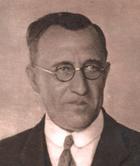
Ramiro de Maeztu (Vitoria 1875-Aravaca 1936) is one of the main figures of the Generation of '98, forming with Baroja and Azorín the so-called "Group of Three". His cosmopolitan descent - Cuban on his father's side and English on his mother's - and his prolonged stay in the City of London as a correspondent for various Spanish newspapers, give him an incomparable socio-economic and financial vision at a national and international level, accompanied by a deep perspective anthropological. As a testimony to his vigorous thinking, the crisis of Humanism (1916), Don Quixote, don Juan and Celestina (1926), Defense of Hispanidad (1929) also stand out.









